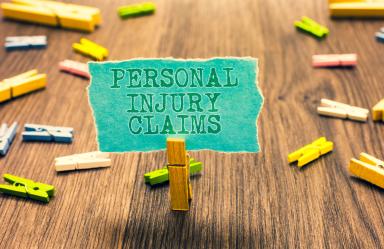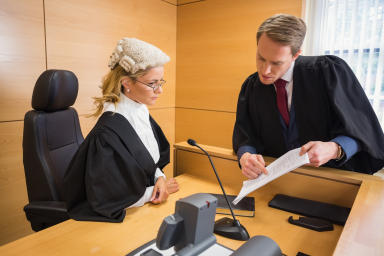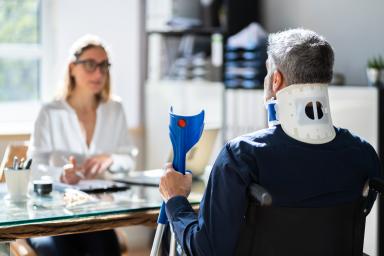What To Expect When Hiring a Personal Injury Lawyer

Injuries requiring medical treatment affect millions of Americans every year. According to the most recent National Center for Health Statistics data, 38 million Americans sought medical consultation in emergency rooms in 2020. The National Highway Traffic Safety Administration reports some 5.5 million car accidents in the U.S. each year, resulting in 3 million injuries and 40,000 fatalities, and 60,000 injuries and 5,000 deaths every year from truck accidents.
In 2005, the U.S. Department of Justice, Bureau of Justice Statistics reported that 60% of the 16,397 tort trials in the nation were related to some form of personal injury. Of those, motor vehicle accidents accounted for 52%, medical malpractice accounted for 15%, and product liability accounted for 5%.
More recent BoJ data is not available, but the big picture is clear: personal injury claims, from auto accidents to dog bites are filed every day in the United States. In most cases, those claims will be handled by a personal injury lawyer. The following guide contains information on how to find a personal injury lawyer, what they can do to help your claim, and what to look for before hiring.
Do I Need a Personal Injury Lawyer?
When harm is caused by third-party negligence, filing a personal injury lawsuit may be the only recourse for the victim. If you’re considering bringing a claim, a personal injury lawyer can help you:
Navigate the complexities of local, state, and federal law
Gather all the necessary paperwork, records, and other supporting evidence
Build the strongest case possible
Negotiate with insurance companies
Make use of expert help
Win in court
Let’s take a closer look at some of the ways a personal injury lawyer can help you pursue a claim.
Insurance, Settlements & Trials
The vast majority of personal injury claims never make it to court. While precise recent data is hard to come by, the U.S. Department of Justice’s 2005 figures estimated that only 4% of personal injury cases go to trial. This would put the number of out-of-court settlements at more than 400,000.
Settlements are negotiated between the claimant and the insurance company of the at-fault party. An experienced and skilled personal injury lawyer can negotiate for a fairer settlement than a claimant working alone. Without legal help, insurance adjusters have the upper hand and will do everything in their power to pay out as little as possible.
Similarly, in the event of going to trial, claimants who employ the services of a lawyer stand a far better chance of winning their court case.
Time & Money
The personal injury claims process can drag on for months and years. Handling paperwork, dealing with insurers, and gathering witnesses is extremely time-consuming, especially for people without legal expertise. The process is even slower if there is a long recovery period from the injuries caused.
A personal injury lawyer can begin working on a compensation claim while their client recovers. Their legal training enables them to navigate the complexities of filing a lawsuit and expedite any compensation. An attorney gathers facts and witnesses, deals with law enforcement and insurers, understands and communicates liability laws, and is familiar with the procedural demands of local courts. In addition, many personal injury lawyers work on a contingency (or ‘no win, no fee’) basis, thus sparing their clients any financial outlay and self-incentivizing to do their utmost to prevail.
Objectivity
The aftermath of an accident can cause stress, anxiety, anger, and other emotions that may negatively impact rational decision-making. Maintaining objectivity following a trauma can be extremely tough. An experienced personal injury lawyer brings the objectivity required to review the facts and build the strongest possible case.
Qualities of a Good Personal Injury Attorney
Finding a personal injury lawyer capable of handling your case with compassion and skill will increase your chances of a good result. With so much competition, it’s not easy to discern who the right person for the job is. Let’s look at some of the qualities you should look for in an attorney.
Specialist Expertise
Good attorneys tend to have focus areas. It’s important to find one who specializes in the specific type of personal injury law your claim falls under, whether it be medical malpractice, commercial truck accidents, product liability, or something else.
Search for firms who specialize in the relevant field. Compare online reviews and narrow your choices down to five or six options. Most personal injury lawyers are happy to provide a free evaluation, so it makes sense to talk to a few and find the best fit.
Trust & Empathy
Mutual trust between attorney and client is absolutely essential. Trust is established early on during the case evaluation stage, so it’s important to ask as many questions as possible to develop rapport. The evaluation consultation should tell you what the attorney can do for you.
Identifying a trustworthy lawyer often comes down to gut feeling, a sense that the right attorney understands where you’re coming from and is not simply looking for a quick payday. Establishing that personal connection can be the difference between winning and losing. Talking to a few different lawyers will give you a sense of who you can trust before hiring.
Results & Credentials
Good litigators will show you a record of their results, including any settlements and court verdicts. They usually make this information easy to find on their website.
Be wary of law firms that don’t appear to have a strong track record or have zero or very few reviews. Avoid firms with high intake and high turnover, as this may suggest a tendency to settle claims for less than they are worth. A reputable attorney won’t pressure you into going for a quick settlement. A track record of good results is a strong indicator of a high-quality lawyer.
Lawyers with solid credentials often have contacts that prove useful to a claim, such as insurance adjusters, legal colleagues, and medical experts. The right lawyer brings more to the table than their own litigation skills.
How To Find and Hire a Personal Injury Lawyer
As we’ve seen, most personal injury claims are best handled by a professional lawyer with experience, expertise, and a strong track record of getting results.
We also have an article dedicated to the process of hiring a personal injury lawyer and what questions to ask.
Research
Start by researching personal injury lawyers in your area who specialize in the focus area relevant to your claim. Look for lawyers with experience handling cases similar to yours. Read reviews from past clients to get an idea of their reputation and success rate. Visit law firm websites to see how their business is run, who’s on the team, and any other information that may tell you whether they’re likely to be a good fit.
While online research is free, hasty wrong decisions can be costly, so it pays to spend time on a deep dive into your options. It may seem overwhelming initially, but you'll quickly develop a sense of what good (and bad) lawyers look like.
Seek Referrals
Ask friends and family for referrals to trustworthy attorneys. If you know any lawyers (even in a different specialization), seek their advice - they may see obvious red flags that aren’t apparent to the untrained eye. When you have a few referrals lined up, arrange to talk to each one over the phone to discuss the details of your injury.
Many local bar associations provide referral services that list attorneys in good standing with their state bar. Before using a referral service, ask about their screening process, including lawyers.
Don't make a decision solely on the basis of someone else's recommendation, even if that person is a trusted friend.
Schedule Consultations
Most personal injury lawyers offer free case evaluations as a way to attract potential clients. As a rule of thumb, any lawyer that wants to charge for an initial consultation should be crossed off the list.
Contact several firms to discuss your case and develop a sense of their communication style, level of expertise, and experience. As with referrals, a thorough comparison shop is worth the time investment.
Be aware that many lawyers won’t take cases that fall below a certain potential recovery threshold. Be prepared for rejection.
Screen Methodically
Case evaluation consultations help lawyers decide whether or not to take your case, but they also provide a valuable opportunity for claimants to evaluate the lawyer.
Preparation is key. Bring copies of all relevant documentation to the consultation. This may include:
Police reports/incident reports
Medical records and bills relating to the claim
Any correspondence with insurance companies or at-fault parties
Documentation of financial losses resulting from injury
More documentation makes it easier for both lawyer and claimant to evaluate the potential of a future client-attorney relationship.
Use your consultation to ask critical questions, such as:
Will they handle the case personally, or pass it to another (perhaps less experienced) attorney on their team?
What percentage of the practice is devoted to the relevant focus area?
How much experience do they have with this type of claim?
Where do they stand on settling vs. going to court?
Have they successfully negotiated out-of-court settlements and litigated claims right up to a jury verdict?
How will the lawyer and their team get paid? Will it be solely on a contingency fee basis?
If we disagree on a settlement offer, will you defer to my wishes?
Will we communicate directly or through a paralegal?
What resources do they have that may help with the case?
Will I receive regular updates?
Remember to take detailed notes throughout the consultation process. If it helps, ask to record audio of the meeting. Repeat this process with each lawyer on your list to compare and contrast what each has to say.
After comparing all the options, choose the lawyer you feel most comfortable working with throughout what could be a long, complex, stressful legal process. Use the tools and resources at Expertise.com to connect with relevant personal injury lawyers in your area.
Legal Resources for Injured Folks
We’ve compiled a list of resources that may be useful during your search. Search our own extensive directory to connect with personal injury attorneys in your area.
Bureau of Justice Statistics
The Bureau of Justice Statistics is the primary statistical agency of the Department of Justice. It focuses predominantly on collecting, compiling, processing, or analyzing information for statistical purposes.
https://bjs.ojp.gov/?tid=45&ty=tp
CDC Injury Statistics
The CDC’s National Center for Health Statistics contains a wealth of accurate health data to keep the nation informed on matters of public health.
https://www.cdc.gov/nchs/fastats/injury.htm
Federal Judicial Caseload Statistics 2022
The Administrative Office of the United States Courts provides statistical information on federal courts’ caseload for the 12-month period ending March 31, 2022. Data is taken from appellate, district, and bankruptcy courts.
https://www.uscourts.gov/statistics-reports/federal-judicial-caseload-statistics-2020
Expertise.com StaffAuthor
Step into the world of Expertise.com, your go-to hub for credible insights. We don't take accuracy lightly around here. Our squad of expert reviewers, each a maestro in their field, has given the green light to every single article you'll find. From rigorous fact-checking to meticulous evaluations of service providers, we've got it all covered. So feel free to dive in and explore. The information you'll uncover has been stamped with the seal of approval by our top-notch experts.




